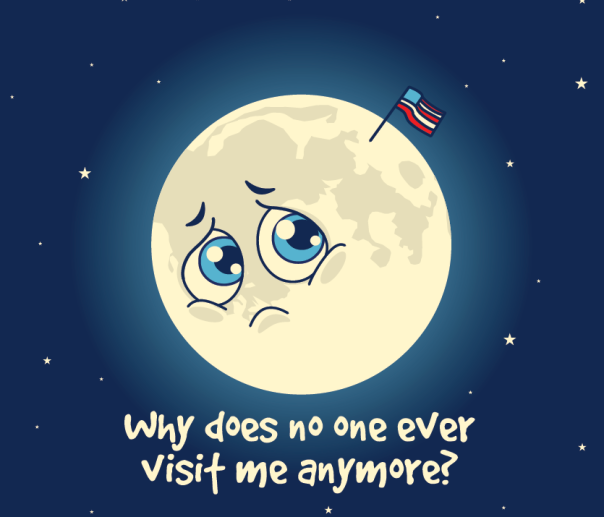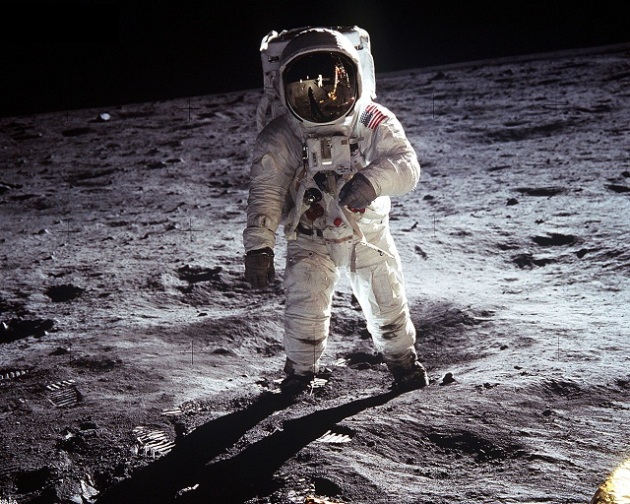Blog Archives
45 Years Later, The Cosmos Makes a Giant Leap Toward Us…
45 Years ago today we landed on the Moon for the very first time. The Apollo 11 team of Michael Collins, Neil Armstrong, and Buzz Aldrin took the first “Giant Leap for Mankind” (humankind) putting the first steps of humanity on a world beyond our own; a world characterized in the words of Buzz Aldrin by “Magnificent Desolation.”
There has been a lot of buzz (pun intended) about the 45th anniversary from screenings of the original landing to renewed debates about the moon landing hoax to an AMA by Buzz Aldrin on Reddit which you should check out. There has also been questions about why we have yet to return.
That is a good question. At the same time, we need to remember that since the late 60’s we have learned an incredible deal about space as we currently find ourselves in a Golden Age of Astronomy. We launched the Voyager Probes in the late 70’s which have just recently reached the edge of our solar system and crossed into inter-stellar space. The 80’s saw the dawn of the space shuttle program leaving the legacies of the International Space Station and Hubble Space Telescope. We got MIND BLOWING images in the 90’s from the Sojourner probe, part of the Mars Pathfinder Program when the Internet was first becoming ubiquitous. As a kid growing up in the 90’s where you could actually download images from Mars…amazing. I believe we actually crashed the NASA servers. We have since returned to Mars recently with Curiosity.
Neil Armstrong and the Shadow of the Moon
This Thursday, September 13th, a public service will be held for Neil Armstrong at the Washington National Cathedral. Armstrong, the first human to set foot on another world, passed away on August 25th. He is to be buried at sea.
When interviewed on Neil’s passing, Jim Lovell, astronaut of Apollo 8 and commander of the infamous Apollo 13, said that water was, for many astronauts, the signal of a mission’s end and would go on to signal the end of life. Armstrong had a long Navy career. Flying nearly 80 combat deployments, all had return flights to the USS Essex aircraft carrier. His Gemini and Apollo missions both ended with parachute deployed splash landings into the Pacific Ocean. When returning home, it was to water. I got the news of Neil’s death by SMS as I was about to deliver a session to a group of new student-staff Residence Advisors at Simon Fraser University. Standing at the front of the lecture hall, I put moment behind me as I continued, but three thoughts that entered my mind; we have lost a very courageous man, he sparked a moment that unified the world, and we have yet to return. I was at a loss for a while to put it all into words, especially since Apollo had been brought very close to us through the interviews with NASA staff for Chasing many of whom worked directly with the rocket. I felt it easiest to express each thought individually:
43 Years since the Moon; 1 Year Since the End of Shuttle
43 years ago yesterday, on July 20th of 1969, humanity set foot for the first time on another world.
1 year ago today, July 21st, Atlantis’ mission, STS135, came to a close with the Shuttle’s safe return to Earth and subsequent finale of the Shuttle Program.
During our presentation at Fantasy and Sci-Fi Convention Polaris in Toronto earlier this month, we had the opportunity to meet several individuals who recalled being woken up by their parents in the early hours of the morning to watch as Neil Armstrong stepped off of the Lunar Lander. This moment in history would go on to be known when the whole world “looked up.” As we talked about Chasing Atlantis, the conversations at Polaris shifted to an expression of disappointment. Since Apollo, we have yet to visit other worlds. After watching the Moon Landing at age 10, one audience member relayed, it seemed reasonable that over 40 years later we’d have planted foot prints on other planets, asteroids, or moons at least within our own solar system.
At the Kennedy Space Center it is clear that the Apollo era is still dominant in how NASA brands itself. One of the largest displays is a Saturn V rocket. Tour guides, many of whom are retired NASA staff who worked during Apollo, recall how NASA’s share of the American GDP was close to 5% during the Space Race. NASA’s budget is now 1/10th that figure. Why? Some would argue politics. The Space Race was about beating the Russians to the Moon. When that was accomplished, there was no further impetus for pouring tax dollars into missions beyond the confines of Low Earth Orbit.
What’s next? Asteroid Mining with Planetary Resources? Mars? Whatever the mission, its success will demand public engagement. Lack of public support for NASA was what many of our interviewees cited as a reason why public funding has waned considerably. Why fund something if it won’t bring in votes? So the debate continues surrounding private entrepreneurship and whether the private entry into space exploration, with the advent of companies like Space X, and Planetary Resources, and space tourism companies such as Virgin Galactic, will bring a new push against the final frontier. Public engagement was a key focus of our documentary. We were excited to connect with both the Apollo generation as well as the current generation of sci-fi and space enthusiasts at Polaris to talk about shuttle; an icon that we realized was not as well recognized by today’s youth as by the previous generation. Perhaps that lack of resonance is partly due to the stagnation of space exploration over the last decades; something we continue to explore in our interviews.
Looking ahead, I am personally hopeful for a future where the next 4 decades see more giant leaps for humankind. The journey outward is about more than the curiosity of what’s beyond our planet, but also seeking a better understanding of ourselves in the process.
Here is a link for a remastered version of the Apollo 11 Moon Landing Footage
And here is a link for a video of Atlantis’ safe return to Earth
-Matthew






